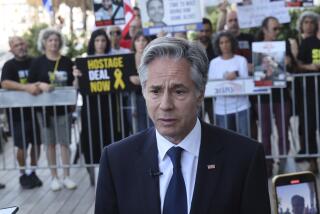Blocking the Khmer Rouge Out
There’s no more promising path to peace in Cambodia on the table right now than the new proposal for an enhanced role by the United Nations. China’s willingness to support the plan raises hopes that finally there may be a resolution of the terrible strife.
The five permanent members of the U.N. Security Council have agreed on a set of principles designed to end the fighting, terminate the flow of foreign arms and outside intervention and clear the way for free elections under U.N. supervision.
It is a tall order, given the awful history of genocide, American and Vietnamese intervention and the continued fragmentation of power in that hapless nation. But recent fighting again has demonstrated that there is no other way out. As the five-power declaration affirms, “No acceptable solution can be achieved by force of arms.”
China, by voting with the United States, the Soviet Union, Britain and France, now appears prepared to accept the reality that its client within Cambodia, the Khmer Rouge, cannot battle its way back to power. The new declaration explicitly denies any of the four warring parties a veto over the peace process as they are brought together in dialogue to facilitate the transition.
It will not be easy to bring the rival groups together, as was evident in the collapse last August of a 19-nation conference seeking to create a government of national reconciliation. The Khmer Rouge, supported by China, is blamed in the deaths of at least a million people during its repressive rule from 1975 to 1978.
The government of Hun Sen is having difficulty shedding the image of being only a puppet of Hanoi even after the withdrawal of Vietnamese troops in September. The United States has played a complex role with support of two political movements, one led by Prince Norodom Sihanouk, the other by former Prime Minister Son Sann, both allied with the Khmer Rouge.
Australia was the architect of the new peace plan, with Indonesia playing an important negotiating role. The plan fits well into the tradition of U.N. peacekeeping as provided by Chapter VII of the U.N. Charter. Unanimity among the permanent Security Council members is the essential ingredient. It is the ingredient that has been missing through so much of the Cold War.
The new move for an enlarged U.N. role comes, unfortunately, at a time when the organization itself has been weakened by failure of members to pay their assessments, even though the assessments are treaty obligations. Members owed $905 million at the end of 1989, including $517.7 million owed by the United States, the principal debtor, according to U.N. tabulations.
At a time when permanent council members are proposing a new peacekeeping venture, the United States’ debt includes $152.7 million for other peacekeeping operations, and the Soviet Union owes $122 million for the Lebanon peacekeeping operation alone. The other permanent members are basically paid up. President Bush had requested full payment last year but Congress refused.
More to Read
Sign up for Essential California
The most important California stories and recommendations in your inbox every morning.
You may occasionally receive promotional content from the Los Angeles Times.










